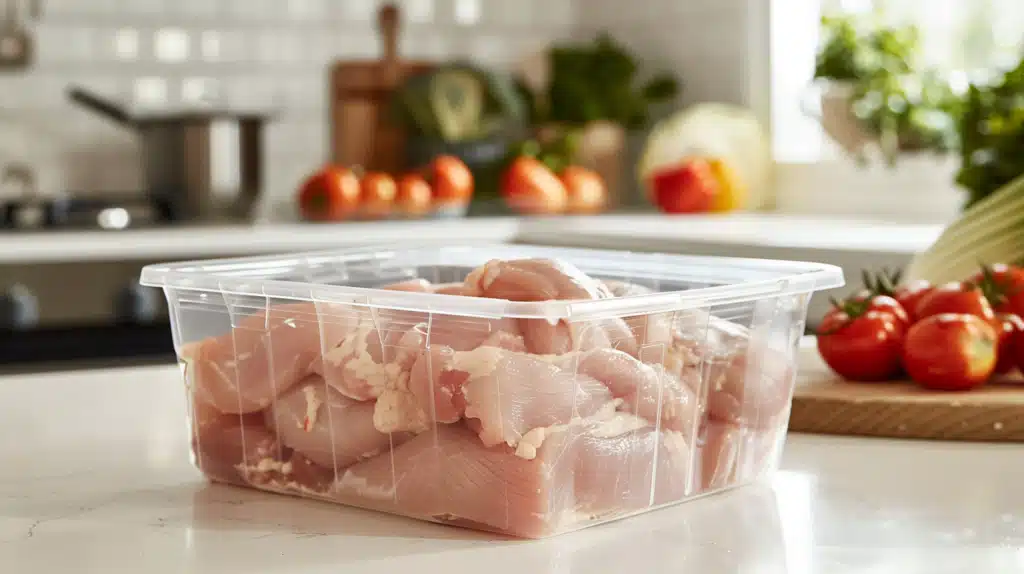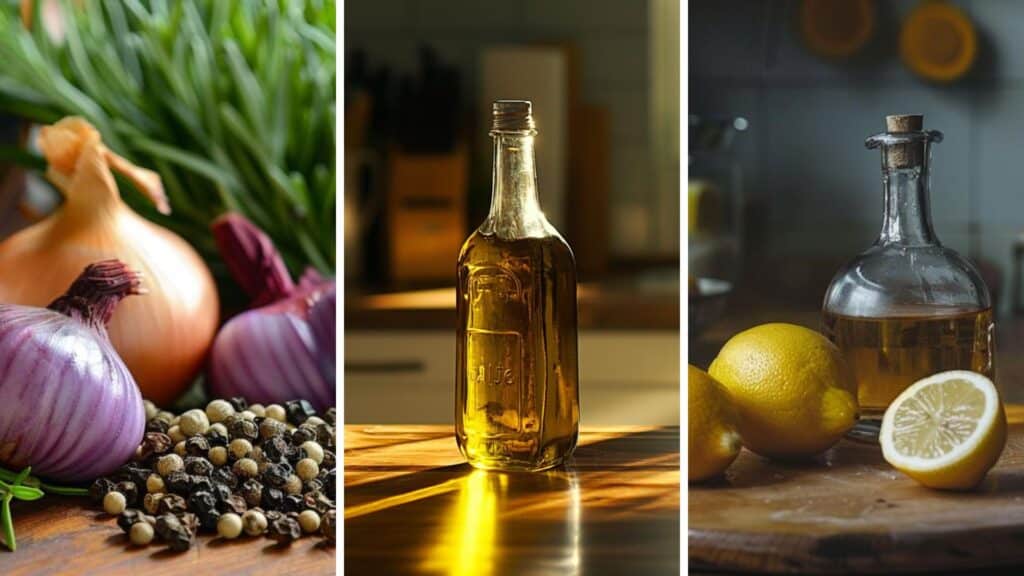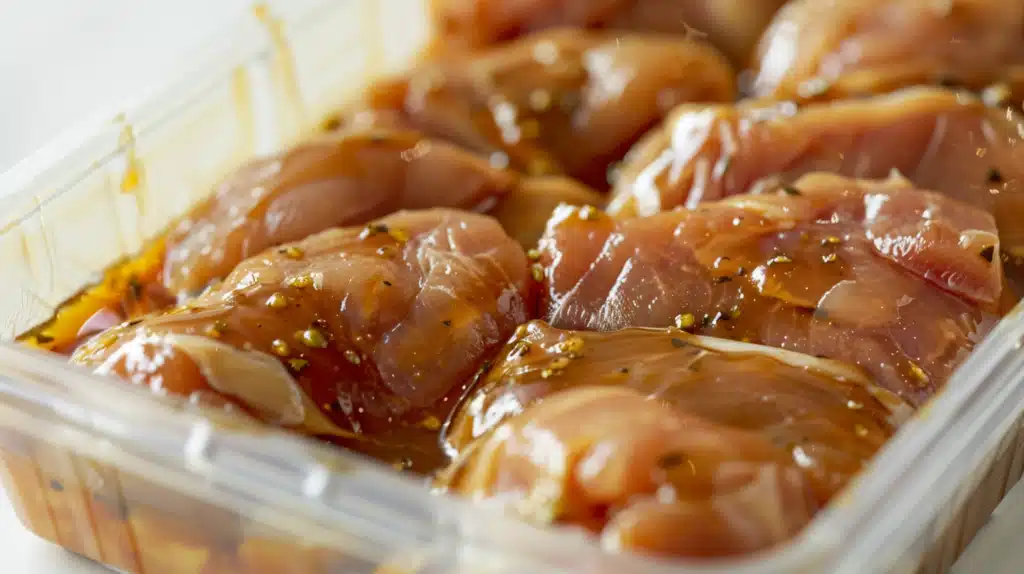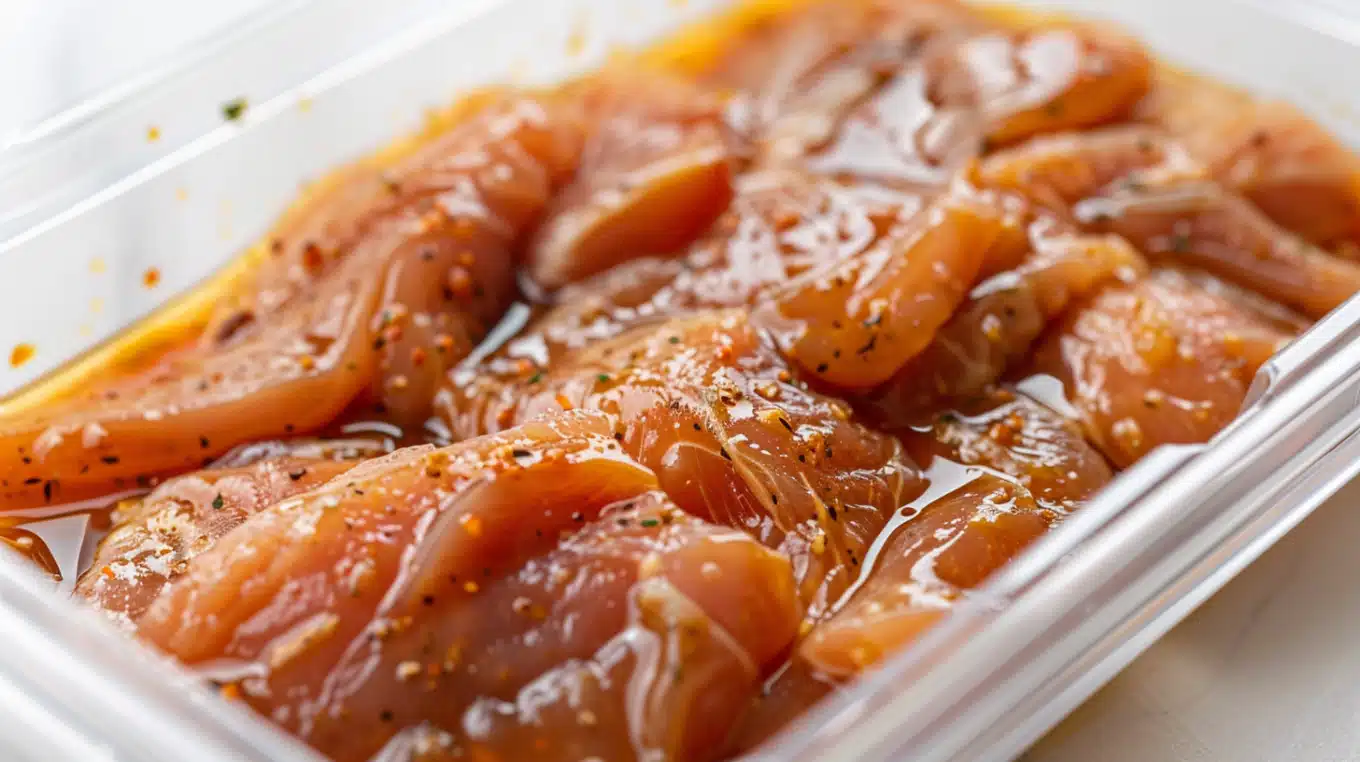Do you enjoy cooking delicious chicken dishes but hate waiting for the chicken to thaw before marinating?
This article will take you on an exciting journey to answer the question, “can you marinate frozen chicken?”
We’ll explore the advantages and disadvantages of this time-saving cooking method while learning about the importance of thawing and marinating food safely.
By the end, you’ll understand whether marinating frozen chicken suits your needs and how to do it confidently.
Get ready to discover a wealth of helpful tips and tricks to elevate your chicken meals to new heights, whether you’re a busy cook looking to save time or a passionate home chef eager to experiment in the kitchen.
So, let’s jump right in and discover the secrets to marinating frozen chicken like a pro!
Understanding Thawing

Thawing is gradually warming frozen food, such as chicken, to a temperature above freezing, typically in preparation for cooking.
This controlled melting of ice crystals within the food is crucial to ensure that it is safe to consume and retains its quality.
Proper thawing allows the food to reach a temperature that can be cooked evenly and safely without the risk of bacterial growth or undesirable texture changes.
Thawing is important because cooking frozen chicken without first defrosting it can lead to several issues.
Firstly, the chicken’s exterior may cook much faster than the interior, resulting in an unevenly cooked and potentially unsafe meal.
Additionally, the texture of the chicken can be compromised if not thawed properly, as the rapid change in temperature during cooking can cause the meat fibers to toughen.
Home cooks and professionals can ensure their chicken dishes are safe, flavorful, and enjoyable by understanding the importance of thawing and employing safe methods such as refrigerators or cold water thawing.
Key Ingredients and Their Roles

- Acids: Acidic ingredients like vinegar, lemon juice, or yogurt help break down proteins in the chicken, making it more tender. These acids also allow the flavors to penetrate the meat more effectively.
- Oils: Like olive or vegetable oil, oils help evenly distribute the marinade’s flavors throughout the chicken. They also help retain moisture during cooking, preventing the chicken from drying.
- Flavorings: Herbs, spices, garlic, onions, and other flavorings give marinades unique taste profiles. These ingredients can be combined to create delicious and diverse chicken dishes.
- Effects on Chicken: A marinade’s combination of acids, oils, and flavorings enhances the chicken’s flavor and texture. The acids tenderize the meat, while the oils and flavorings infuse it with a mouth-watering taste, resulting in a more enjoyable eating experience.
Marinating Frozen Chicken
Marinating frozen chicken involves soaking it in a flavorful liquid while still frozen.
This practice is often employed to save time and infuse the chicken with flavor during thawing.
Understanding the feasibility, advantages, and disadvantages of marinating frozen chicken is important for home cooks and culinary professionals.
By exploring the pros and cons, individuals can decide whether this technique aligns with their cooking goals and safety standards.
Pros of Marinating During Thawing
1. Enhanced Flavor Absorption
Marinating frozen chicken during the thawing process can be an effective way to enhance flavor absorption.
As the chicken slowly defrosts, the ice crystals within the meat begin to melt, creating channels for the marinade to penetrate deeper into the flesh.
This allows the flavors from the marinade to be absorbed more thoroughly, resulting in a more flavorful end product.
The gradual thawing process also gives the marinade more time to work its magic, as the chicken remains in contact with the delicious liquid for an extended period.
However, it’s crucial to ensure that the thawing process occurs in a safe environment, such as the refrigerator, to prevent bacterial growth and potential foodborne illnesses.
2. Practical Benefits for Meal Preparation
Marinating frozen chicken offers a convenient and time-saving approach to meal preparation.
Combining the thawing and marinating steps gives you a flavorful, ready-to-cook meal as soon as the chicken has defrosted.
This method particularly benefits busy people who want to streamline their cooking process without sacrificing taste.
Instead of waiting for the chicken to thaw and then marinating it separately, you can let it absorb the marinade flavors while it defrosts in the refrigerator.
This saves valuable time and reduces the overall preparation and cleanup involved.
When you’re ready to cook, remove the chicken from the marinade and proceed with your desired cooking method, knowing that the flavors have had ample time to infuse into the meat.
Cons of Marinating During Thawing
1. Potential for Bacterial Growth and Food Safety Risks
Improper temperature control during thawing can create an environment that promotes bacterial growth, leading to serious health risks.
Harmful bacteria like Salmonella and Campylobacter can multiply rapidly when chicken is not thawed using safe methods, such as refrigeration or cold water thawing.
These bacteria thrive in temperatures between 40°F (4°C) and 140°F (60°C), known as the “danger zone.”
If the frozen chicken is left to thaw at room temperature or in warm water, it can quickly enter this danger zone, allowing bacteria to increase exponentially.
Consuming chicken exposed to these conditions can result in severe foodborne illnesses, which can cause symptoms such as nausea, vomiting, diarrhea, and fever.
Adhering to proper thawing techniques and maintaining strict temperature control throughout the process is crucial to minimizing these risks.
2. Issues with Flavor Distribution and Texture Degradation
Marinating frozen chicken can lead to uneven flavor distribution, as the marinade may struggle to penetrate the meat uniformly while it is still partially frozen.
The ice crystals within the frozen chicken can create a barrier, preventing the marinade from reaching the center of the meat.
As a result, the chicken’s exterior may be overly flavorful, while the interior could be more varied.
Furthermore, when applied to frozen tissue, the marinade’s acidic components, such as vinegar or citrus juices, can more aggressively break down the chicken’s proteins.
This can cause the meat fibers to deteriorate, leading to a mushy or unpleasant texture once the chicken is cooked.
The longer the frozen chicken remains in the marinade, the more pronounced these texture issues can become.
To avoid these problems, it is generally recommended that the chicken be thawed completely before marinating. This ensures that the flavors are evenly distributed and that the texture of the meat is not compromised.
The table below summarizes all the key points about the pros and cons of marinating frozen chicken during thawing.

| Aspect | Pros of Marinating During Thawing | Cons of Marinating During Thawing |
|---|---|---|
| Flavor Absorption | Enhanced flavor absorption as chicken thaws, allowing the marinade to penetrate deeper into the meat. | There is a potential for uneven flavor distribution, with marinade not effectively reaching the chicken’s center. |
| Time Efficiency | Saves time by combining thawing and marinating processes, making meal preparation quicker and more efficient. | Extended exposure to marinade can lead to over-marination, affecting the texture and quality of the chicken. |
| Practicality | Convenient for busy individuals, allowing for advanced meal preparation with minimal active effort. | It requires careful monitoring to ensure safe thawing temperatures, which increases handling complexity. |
| Food Safety | Marinating in the refrigerator can keep the chicken safe from bacterial growth during the thawing process. | If not properly managed, the chicken may remain in the “danger zone” temperature for too long, causing bacterial growth. |
| Texture | The gradual thawing and marinating process can potentially make the chicken more tender. | If left too long, the marinade’s acid can break down proteins excessively, leading to a mushy texture. |
Conclusion
Marinating frozen chicken has its advantages and disadvantages.
While it can save time and infuse flavor, it has potential safety concerns and uneven results.
The key is to follow proper thawing techniques, like using the refrigerator or cold water method, and to cook the chicken immediately after it’s fully thawed.
Understanding the science behind marinating and the importance of temperature control can help you decide whether this method is right.
Whether you choose to marinate frozen or thawed chicken, always prioritize food safety and enjoy the delicious results of a well-seasoned meal.
So, the next time you’re in a pinch, consider the pros and cons of marinating frozen chicken and feel confident creating a flavorful dish.
Frequently Asked Questions
What Are the Two Rules for The Safe Marination of Meat?
Marinate in the refrigerator, not at room temperature, and discard used marinade to avoid contamination from raw meat.
What Happens if You Marinate Chicken in Soy Sauce?
Marinating chicken in soy sauce will make it more flavorful and tender, but its high sodium content can also result in a saltier taste and darker color.
How Do I Choose a Marinade?
Consider the type of meat, desired flavor profile, and cooking method. Look for a balance of acid, oil, and seasonings. Experiment with different ingredients to find your favorite combination.




